Yugoslavia – ranked 14th by UEFA. Last 2 relegated.
 Standing from left: Trener Luštica, Jovanić, Buljan, Bošković, Vukčević, Pavlica, Gluić, Sirković, Nadoveza, Lemešić, Peruzović, Katalinić, Beara;
Standing from left: Trener Luštica, Jovanić, Buljan, Bošković, Vukčević, Pavlica, Gluić, Sirković, Nadoveza, Lemešić, Peruzović, Katalinić, Beara;
Front: Holcer, Smolčić, Jerković, Vardić, Zrilić, Boljat, Hlevnjak, Džoni, Žutelija, Bonačić, Soldo.
Hajduk Split 34 18 13 3 61 31 49
 Back row from left: Trener Ribar, Selimović, Sprečo, Mujkić, Bukal, Katalinski, Janković, Kojović, Šerbo, Bećirspahić, Radović, Osim;
Back row from left: Trener Ribar, Selimović, Sprečo, Mujkić, Bukal, Katalinski, Janković, Kojović, Šerbo, Bećirspahić, Radović, Osim;
Front: M.Šljivo, Bajić, Hadžiabdić, Deraković, Bratić, Lazarević, Hrvat, Kadrić, Jelušić, Todorović.
2. Zeljeznicar Sarajevo 34 18 9 7 59 34 45

 3. Dinamo Zagreb 34 17 9 8 55 32 43
3. Dinamo Zagreb 34 17 9 8 55 32 43
 Standing from left: Tr. Drenovac, Mešanović, Đorđević, Mitrović, Vlaović, Stepanović, Krivokuća, Vukašinović, Borota, Jokić, tr. Mihajlović;
Standing from left: Tr. Drenovac, Mešanović, Đorđević, Mitrović, Vlaović, Stepanović, Krivokuća, Vukašinović, Borota, Jokić, tr. Mihajlović;
Sitting: Mihajlović, Turudija, Zec, Santrač, Lukić, Petković, Tričković, Stojanović.
4. OFK Beograd 34 15 8 11 54 44 38
 5. Partizan Beograd 34 14 10 10 44 34 38
5. Partizan Beograd 34 14 10 10 44 34 38
 6. C.Zvezda Beograd 34 14 8 12 62 46 36
6. C.Zvezda Beograd 34 14 8 12 62 46 36
 7. Olimpija Ljubljana 34 13 10 11 47 35 36
7. Olimpija Ljubljana 34 13 10 11 47 35 36
 8. Velez Mostar 34 14 8 12 52 48 36
8. Velez Mostar 34 14 8 12 52 48 36
 9. Celik Zenica 34 14 8 12 35 32 36
9. Celik Zenica 34 14 8 12 35 32 36
 10. Sloboda Tuzla 34 9 14 11 23 29 32
10. Sloboda Tuzla 34 9 14 11 23 29 32
 11. Radnicki Nis 34 11 9 14 38 43 31
11. Radnicki Nis 34 11 9 14 38 43 31

 12. Sarajevo 34 9 11 14 42 51 29
12. Sarajevo 34 9 11 14 42 51 29
 Standing from left: Vabič, Simeunović, Filipović, Rosignoli, Rašević, Bolfek, Perazić, Horvatič, trener Omeragić;
Standing from left: Vabič, Simeunović, Filipović, Rosignoli, Rašević, Bolfek, Perazić, Horvatič, trener Omeragić;
Crouching:Janković, Kobešćak, Maras, Prosen, Horjak, Koblencer, Radić, Klančnik.
13. Maribor 34 9 11 14 33 48 29

 14. Borac Banja Luka 34 9 11 14 47 66 29
14. Borac Banja Luka 34 9 11 14 47 66 29
 15. Vojvodina Novi Sad 34 10 9 15 38 43 28
15. Vojvodina Novi Sad 34 10 9 15 38 43 28

 16. Radnicki Kragujevac 34 9 10 15 29 50 28
16. Radnicki Kragujevac 34 9 10 15 29 50 28

 17. Bor 34 9 8 17 43 66 26
17. Bor 34 9 8 17 43 66 26
 Standing from left: Jovanic, Svilar, Milovanovic, Jovovic, Bacic, Santa, Savic, trener Petrovic,
Standing from left: Jovanic, Svilar, Milovanovic, Jovovic, Bacic, Santa, Savic, trener Petrovic,
Crouching: Cabarkapa, Ostojic, Beslin, Basta, Pusibrk
18. Crvenka 34 8 7 19 28 58 23
 ___Hajduk won their 6th title after waiting 16 years for success.
___Hajduk won their 6th title after waiting 16 years for success.
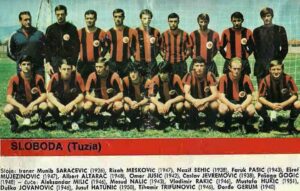 Too bad – Sloboda reached the final, but was outclassed and destroyed by superior opponent.
Too bad – Sloboda reached the final, but was outclassed and destroyed by superior opponent.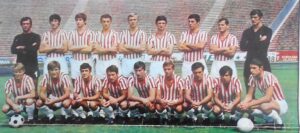 The winners: standing from left: Ratomir Dujkovic,Petar Krivokuca,Vladislav Bogicevic,Milovan Djoric,Mihalj Keri,Sava Karapandzic,Kiril Dijcinovski,Branko Klenkovski,Bosko Kajganic.
The winners: standing from left: Ratomir Dujkovic,Petar Krivokuca,Vladislav Bogicevic,Milovan Djoric,Mihalj Keri,Sava Karapandzic,Kiril Dijcinovski,Branko Klenkovski,Bosko Kajganic.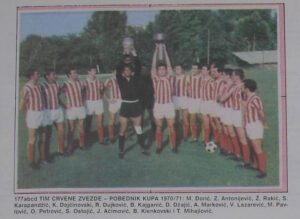 Second consecutive Cup and 9th altogether.
Second consecutive Cup and 9th altogether.
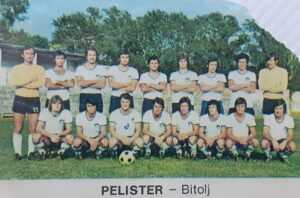 Pelister (Bitola)
Pelister (Bitola)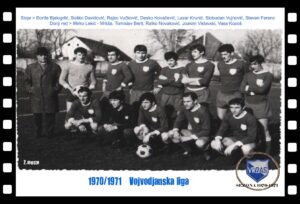 FK Vrbas – amateur champion of Yugoslavia.
FK Vrbas – amateur champion of Yugoslavia.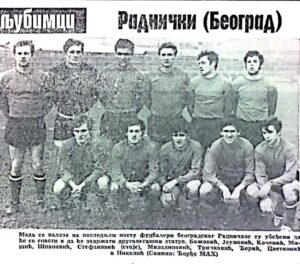 Radnicki (Belgrade)
Radnicki (Belgrade)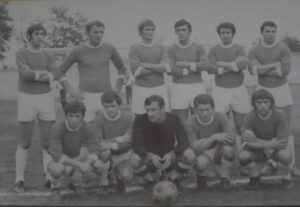 Polet (Nakovo)
Polet (Nakovo)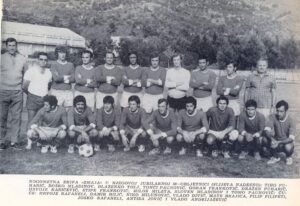 Zmaj (Makarska)
Zmaj (Makarska)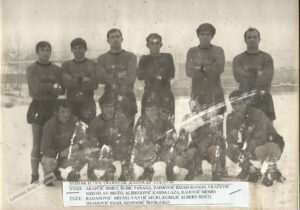 Radnicki (Lukavac)
Radnicki (Lukavac)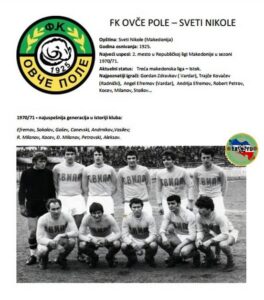 FK Ovce Pole (Sveti Nikole)
FK Ovce Pole (Sveti Nikole)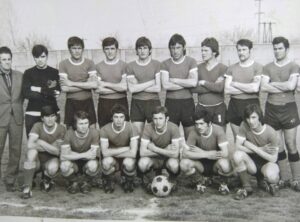 FK Madzari (Skopje)
FK Madzari (Skopje)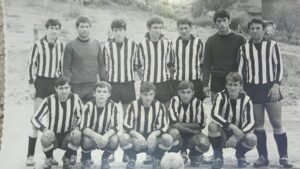
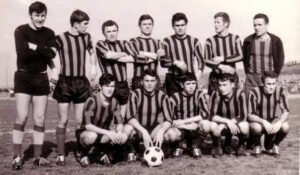 FK Loznica
FK Loznica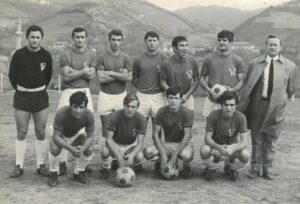 Metohija (Prizren)
Metohija (Prizren)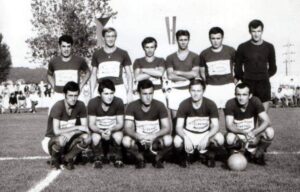 OFK Mladenovac
OFK Mladenovac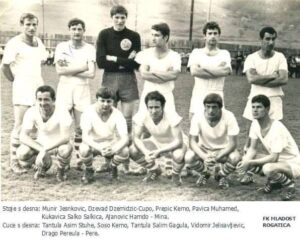 Mladost (Rogatica)
Mladost (Rogatica)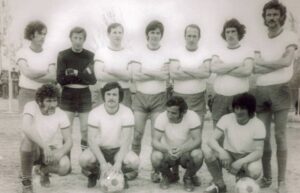 Jadran (Ploce)
Jadran (Ploce)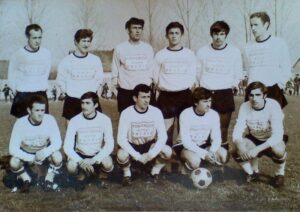 Hajduk (Orasje)
Hajduk (Orasje)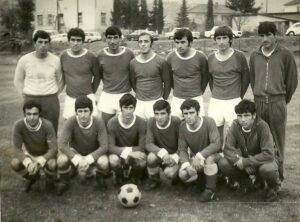 Pobeda (Valandovo). Standing from left: Petar Todorov, Risto Božinov, Lazar Atanasov, Mitko Delev, Risto Andonov, Đorđe Janov, Mile Boev,
Pobeda (Valandovo). Standing from left: Petar Todorov, Risto Božinov, Lazar Atanasov, Mitko Delev, Risto Andonov, Đorđe Janov, Mile Boev,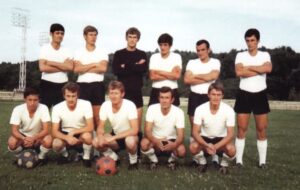 Metalac (Sisak). Back row from left: Medarević, Jandraš, Greić, Čučković, Marković, Radišić
Metalac (Sisak). Back row from left: Medarević, Jandraš, Greić, Čučković, Marković, Radišić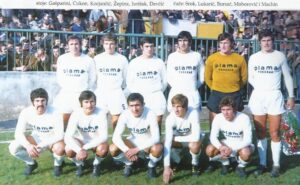
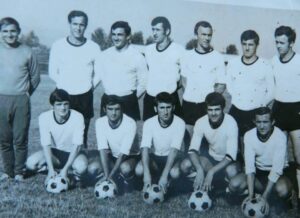 2.Rudar Ljubija 30 21 3 6 49:20 45 PROMOTION PLAY-OFF
2.Rudar Ljubija 30 21 3 6 49:20 45 PROMOTION PLAY-OFF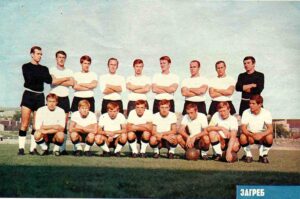 3.Zagreb 30 19 5 6 63:27 43
3.Zagreb 30 19 5 6 63:27 43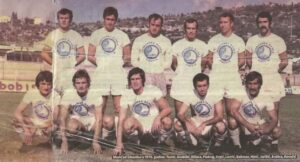 4.Sibenik 30 17 8 5 51:27 42
4.Sibenik 30 17 8 5 51:27 42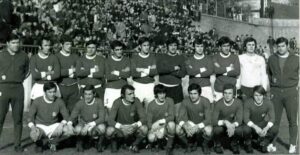 7.Orijent Rijeka 30 9 10 11 36:38 28
7.Orijent Rijeka 30 9 10 11 36:38 28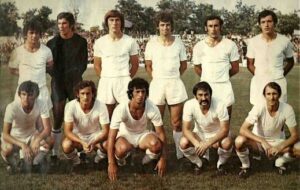 1.Proleter Zrenjanin 30 14 11 5 53:28 39 PROMOTION PLAY-OFF
1.Proleter Zrenjanin 30 14 11 5 53:28 39 PROMOTION PLAY-OFF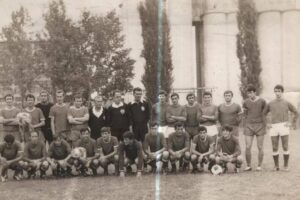 Osijek – dark shorts -vs Radnicki (Sid)
Osijek – dark shorts -vs Radnicki (Sid)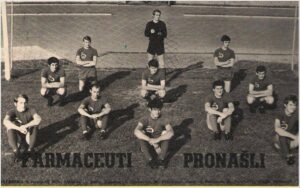 6.Galenika Zemun 30 12 8 10 47:44 32
6.Galenika Zemun 30 12 8 10 47:44 32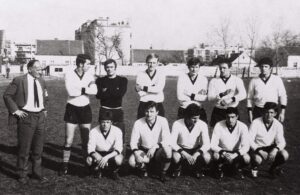 Srem (Sremska Mitrovica)
Srem (Sremska Mitrovica)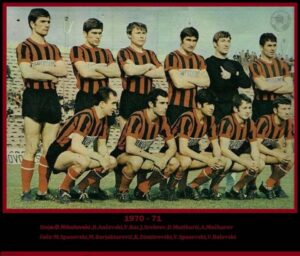 1.Vardar Skopje 30 19 5 6 46:18 43 PROMOTION PLAY-OFF
1.Vardar Skopje 30 19 5 6 46:18 43 PROMOTION PLAY-OFF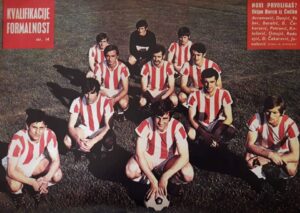 2.Borac Cacak 30 17 9 4 40:13 43 PROMOTION PLAY-OFF
2.Borac Cacak 30 17 9 4 40:13 43 PROMOTION PLAY-OFF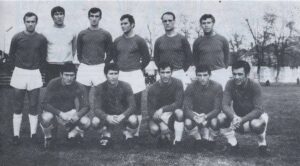 Standing from left: Đorđioski, Istatov, Mirčeski, Mečev, Koneski, Angeleski,
Front: Badrljica, Trajkov, Gligoroski, Mitrev, Nikoloski.
Standing from left: Đorđioski, Istatov, Mirčeski, Mečev, Koneski, Angeleski,
Front: Badrljica, Trajkov, Gligoroski, Mitrev, Nikoloski.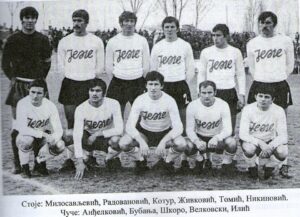 4.Napredak Krusevac 30 12 8 10 43:32 32
4.Napredak Krusevac 30 12 8 10 43:32 32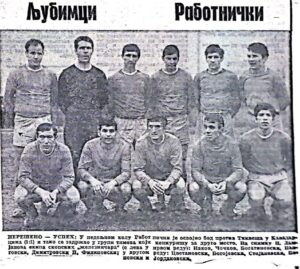 6.Rabotnicki Skopje 30 12 5 13 50:46 29
6.Rabotnicki Skopje 30 12 5 13 50:46 29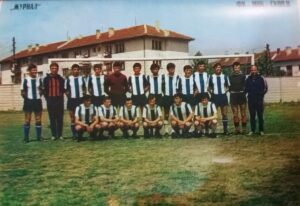 7.MIK Skopje 30 13 3 14 42:52 29
7.MIK Skopje 30 13 3 14 42:52 29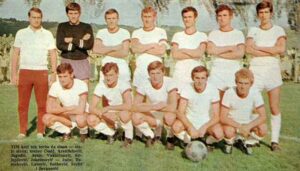 8.Sloboda Titovo Uzice 30 10 8 12 36:33 28
8.Sloboda Titovo Uzice 30 10 8 12 36:33 28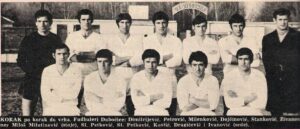 11.Dubocica Leskovac 30 12 4 14 33:40 28
11.Dubocica Leskovac 30 12 4 14 33:40 28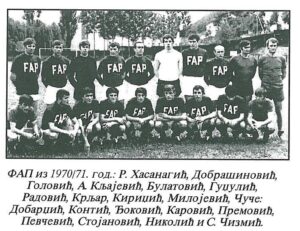 12.FAP Priboj 30 10 7 13 33:41 27
12.FAP Priboj 30 10 7 13 33:41 27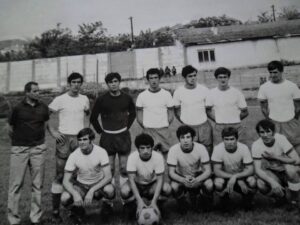 14.Bregalnica Stip 30 10 7 13 24:37 27
14.Bregalnica Stip 30 10 7 13 24:37 27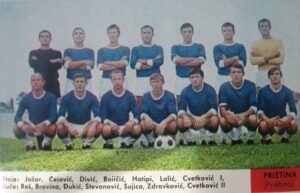 15.Pristina 30 9 8 13 44:44 26
15.Pristina 30 9 8 13 44:44 26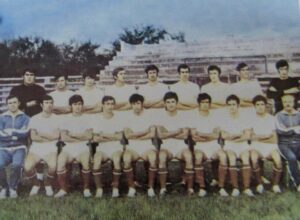
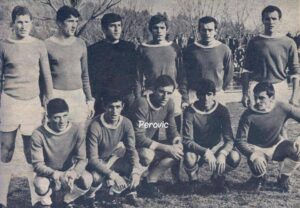 Back row from left: Savkovic, Ivanovic, Vujacic, Mitrovic, Folic, Kovacevic,
Crouching: Sakovic, Jovetic, Perovic, Todorovic, Ceric
Back row from left: Savkovic, Ivanovic, Vujacic, Mitrovic, Folic, Kovacevic,
Crouching: Sakovic, Jovetic, Perovic, Todorovic, Ceric 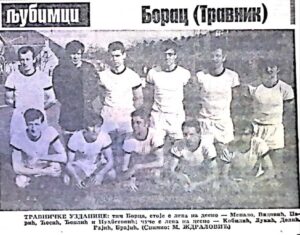 4.Borac Travnik 30 12 10 8 39:38 34
4.Borac Travnik 30 12 10 8 39:38 34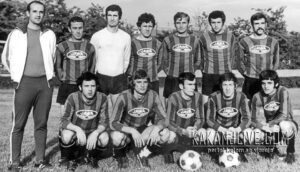 5.Rudar Kakanj 30 12 8 10 48:46 32
5.Rudar Kakanj 30 12 8 10 48:46 32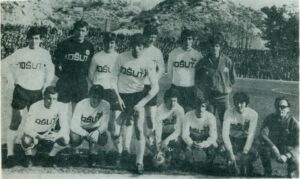 6.Lovcen Cetinje 30 12 6 12 42:37 30
6.Lovcen Cetinje 30 12 6 12 42:37 30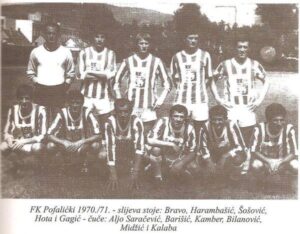 7.Pofalicki Sarajevo 30 9 10 11 28:34 28
7.Pofalicki Sarajevo 30 9 10 11 28:34 28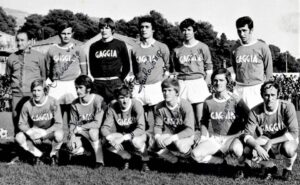 11.GOSK Dubrovnik 30 9 9 12 36:35 27
11.GOSK Dubrovnik 30 9 9 12 36:35 27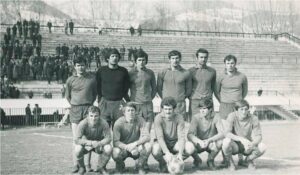 12.Famos Hrasnica 30 9 9 12 32:36 27
12.Famos Hrasnica 30 9 9 12 32:36 27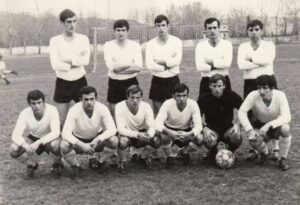 14.Borac Capljina 30 9 9 12 26:47 27
14.Borac Capljina 30 9 9 12 26:47 27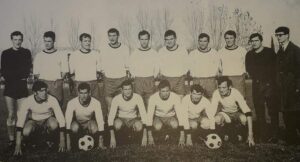 Promoted from 3rd league: Neretva (Metkovic),
Promoted from 3rd league: Neretva (Metkovic), 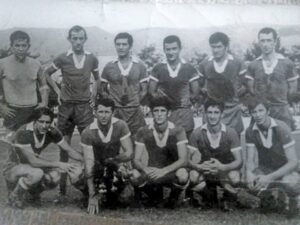 Lokomotiva (Mostar), Radnik (Hadzici) and Bokelj (Kotor)
Lokomotiva (Mostar), Radnik (Hadzici) and Bokelj (Kotor)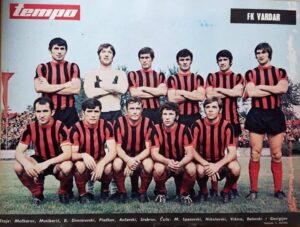 Vardar (Skoplje) and
Vardar (Skoplje) and 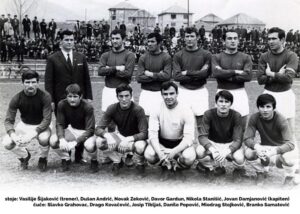 Sutjeska (Niksic) promoted to 1st league.
Sutjeska (Niksic) promoted to 1st league. Standing from left: Trener Luštica, Jovanić, Buljan, Bošković, Vukčević, Pavlica, Gluić, Sirković, Nadoveza, Lemešić, Peruzović, Katalinić, Beara;
Standing from left: Trener Luštica, Jovanić, Buljan, Bošković, Vukčević, Pavlica, Gluić, Sirković, Nadoveza, Lemešić, Peruzović, Katalinić, Beara; Back row from left: Trener Ribar, Selimović, Sprečo, Mujkić, Bukal, Katalinski, Janković, Kojović, Šerbo, Bećirspahić, Radović, Osim;
Back row from left: Trener Ribar, Selimović, Sprečo, Mujkić, Bukal, Katalinski, Janković, Kojović, Šerbo, Bećirspahić, Radović, Osim;
 3. Dinamo Zagreb 34 17 9 8 55 32 43
3. Dinamo Zagreb 34 17 9 8 55 32 43 Standing from left: Tr. Drenovac, Mešanović, Đorđević, Mitrović, Vlaović, Stepanović, Krivokuća, Vukašinović, Borota, Jokić, tr. Mihajlović;
Standing from left: Tr. Drenovac, Mešanović, Đorđević, Mitrović, Vlaović, Stepanović, Krivokuća, Vukašinović, Borota, Jokić, tr. Mihajlović; 5. Partizan Beograd 34 14 10 10 44 34 38
5. Partizan Beograd 34 14 10 10 44 34 38 6. C.Zvezda Beograd 34 14 8 12 62 46 36
6. C.Zvezda Beograd 34 14 8 12 62 46 36 7. Olimpija Ljubljana 34 13 10 11 47 35 36
7. Olimpija Ljubljana 34 13 10 11 47 35 36 8. Velez Mostar 34 14 8 12 52 48 36
8. Velez Mostar 34 14 8 12 52 48 36 9. Celik Zenica 34 14 8 12 35 32 36
9. Celik Zenica 34 14 8 12 35 32 36 10. Sloboda Tuzla 34 9 14 11 23 29 32
10. Sloboda Tuzla 34 9 14 11 23 29 32 11. Radnicki Nis 34 11 9 14 38 43 31
11. Radnicki Nis 34 11 9 14 38 43 31
 12. Sarajevo 34 9 11 14 42 51 29
12. Sarajevo 34 9 11 14 42 51 29 Standing from left: Vabič, Simeunović, Filipović, Rosignoli, Rašević, Bolfek, Perazić, Horvatič, trener Omeragić;
Standing from left: Vabič, Simeunović, Filipović, Rosignoli, Rašević, Bolfek, Perazić, Horvatič, trener Omeragić;
 15. Vojvodina Novi Sad 34 10 9 15 38 43 28
15. Vojvodina Novi Sad 34 10 9 15 38 43 28
 16. Radnicki Kragujevac 34 9 10 15 29 50 28
16. Radnicki Kragujevac 34 9 10 15 29 50 28
 17. Bor 34 9 8 17 43 66 26
17. Bor 34 9 8 17 43 66 26 Standing from left: Jovanic, Svilar, Milovanovic, Jovovic, Bacic, Santa, Savic, trener Petrovic,
Standing from left: Jovanic, Svilar, Milovanovic, Jovovic, Bacic, Santa, Savic, trener Petrovic, ___Hajduk won their 6th title after waiting 16 years for success.
___Hajduk won their 6th title after waiting 16 years for success.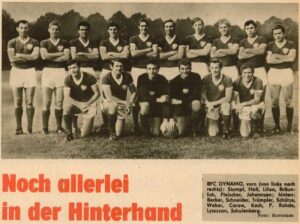 Dynamo (East Berlin) survived to extra-time, yet lost.
Dynamo (East Berlin) survived to extra-time, yet lost.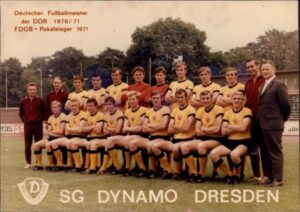 Not an easy win, but Dynamo (Dresden) triumphed.
Not an easy win, but Dynamo (Dresden) triumphed.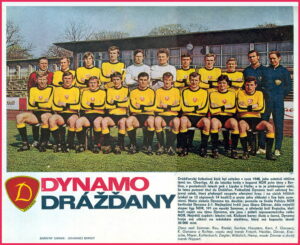 First double – a great season. Records were still low: second title, second Cup.
First double – a great season. Records were still low: second title, second Cup.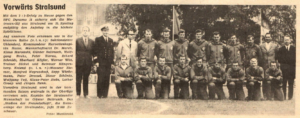 1.ASG Vorwärts Stralsund 38 26 15- 8- 3 44:15 +29 ++
1.ASG Vorwärts Stralsund 38 26 15- 8- 3 44:15 +29 ++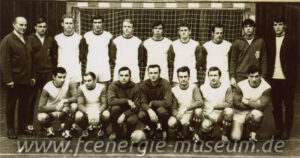 Standing from left: Erich Lüdecke (Cheftrainer), Klaus Exner, Manfred Kupferschmied, Horst Krautzig, Werner Wehner, Dieter Paulo, Hans Böttcher, Manfred Duchrow, Lutz Grüneberg, Siegfried Becker.
Standing from left: Erich Lüdecke (Cheftrainer), Klaus Exner, Manfred Kupferschmied, Horst Krautzig, Werner Wehner, Dieter Paulo, Hans Böttcher, Manfred Duchrow, Lutz Grüneberg, Siegfried Becker.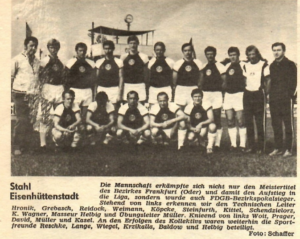 15.BSG Stahl Eisenhüttenstadt — — – – — — — —
15.BSG Stahl Eisenhüttenstadt — — – – — — — —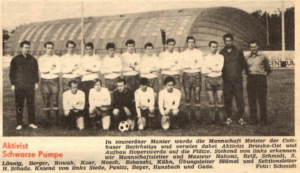 16.BSG Aktivist Schwarze Pumpe — — – – — — — —
16.BSG Aktivist Schwarze Pumpe — — – – — — — —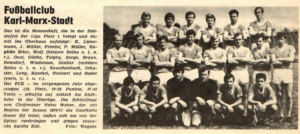 1. FC Karl Marx Stadt 50 30 23- 4- 3 72:16 +56 ++
1. FC Karl Marx Stadt 50 30 23- 4- 3 72:16 +56 ++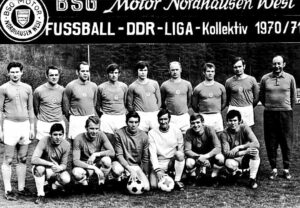 3. BSG Motor Nordhausen-West 38 30 14-10- 6 52:36 +16
3. BSG Motor Nordhausen-West 38 30 14-10- 6 52:36 +16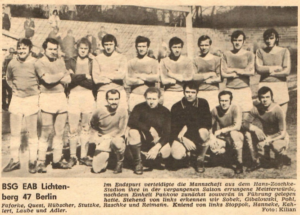 BAB Lichtenberg 47 Berlin
BAB Lichtenberg 47 Berlin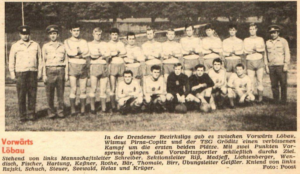 ASG Vorwärts Löbau
ASG Vorwärts Löbau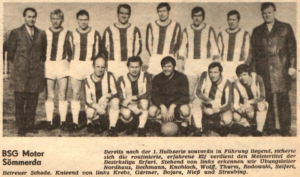 BSG Motor Sömmerda
BSG Motor Sömmerda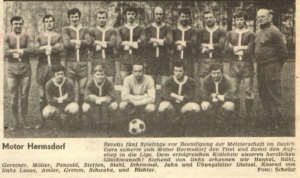 BSG Motor Hermsdorf
BSG Motor Hermsdorf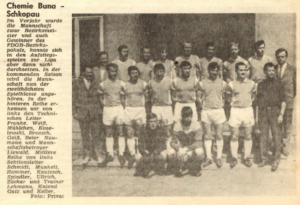 BSG Chemie Buna Schkopau
BSG Chemie Buna Schkopau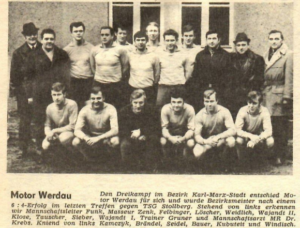 BSG Motor Werdau
BSG Motor Werdau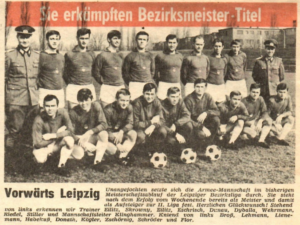 ASG Vorwärts Leipzig
ASG Vorwärts Leipzig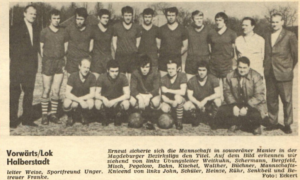 BSG Lokomotive/Vorwärts Halberstadt
BSG Lokomotive/Vorwärts Halberstadt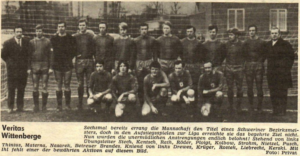
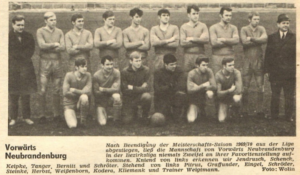 ASG Vorwärts Neubrandenburg
ASG Vorwärts Neubrandenburg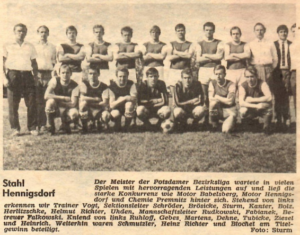 BSG Stahl Hennigsdorf
BSG Stahl Hennigsdorf BSG Einheit Grevesmühlen
BSG Einheit Grevesmühlen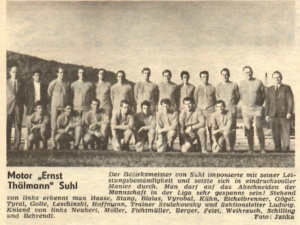 BSG Motor Suhl
BSG Motor Suhl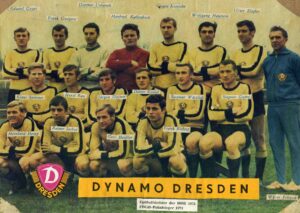
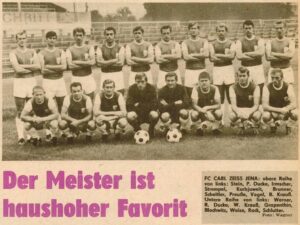 2 FC Carl Zeiss Jena 26 14 5 7 58 29 +29 33
2 FC Carl Zeiss Jena 26 14 5 7 58 29 +29 33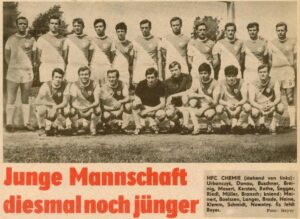 3 Hallescher FC Chemie 26 10 10 6 35 29 +6 30
3 Hallescher FC Chemie 26 10 10 6 35 29 +6 30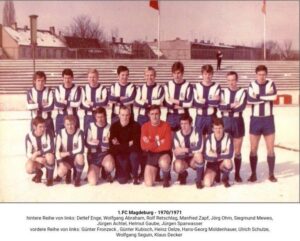 4 1. FC Magdeburg 26 10 7 9 37 38 −1 27
4 1. FC Magdeburg 26 10 7 9 37 38 −1 27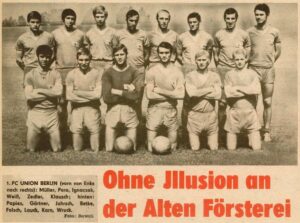 5 1. FC Union Berlin 26 8 11 7 27 33 −6 27
5 1. FC Union Berlin 26 8 11 7 27 33 −6 27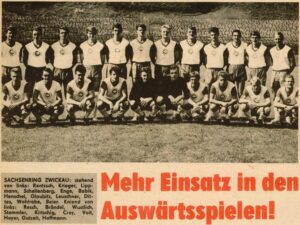 6 BSG Sachsenring Zwickau 26 11 4 11 40 42 −2 26
6 BSG Sachsenring Zwickau 26 11 4 11 40 42 −2 26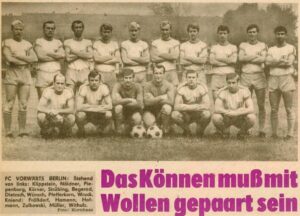 7 FC Vorwärts Berlin 26 10 6 10 38 44 −6 26
7 FC Vorwärts Berlin 26 10 6 10 38 44 −6 26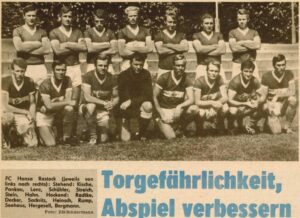 8 F.C. Hansa Rostock 26 10 5 11 31 25 +6 25
8 F.C. Hansa Rostock 26 10 5 11 31 25 +6 25 9 BFC Dynamo 26 10 5 11 31 29 +2 25
9 BFC Dynamo 26 10 5 11 31 29 +2 25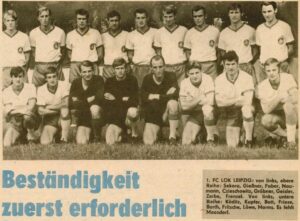 10 1. FC Lokomotive Leipzig 26 9 6 11 42 46 −4 24
10 1. FC Lokomotive Leipzig 26 9 6 11 42 46 −4 24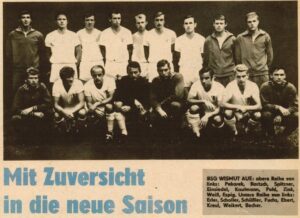 11 BSG Wismut Aue 26 8 5 13 30 36 −6 21
11 BSG Wismut Aue 26 8 5 13 30 36 −6 21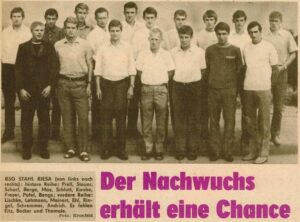 12 Stahl Riesa 26 6 9 11 28 41 −13 21
12 Stahl Riesa 26 6 9 11 28 41 −13 21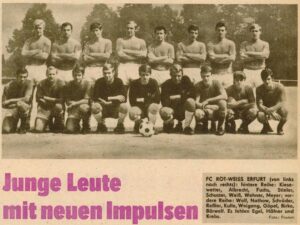 13 FC Rot-Weiss Erfurt (R) 26 6 9 11 28 44 −16 21
13 FC Rot-Weiss Erfurt (R) 26 6 9 11 28 44 −16 21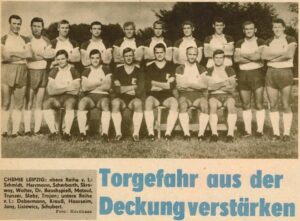 14 BSG Chemie Leipzig (R) 26 5 9 12 27 43 −16 19
14 BSG Chemie Leipzig (R) 26 5 9 12 27 43 −16 19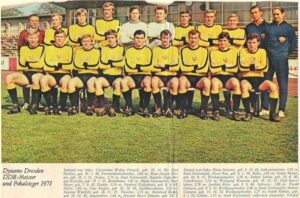 Dynamo (Dresden) won their 2nd title after a long wait – since 1952-53.
Dynamo (Dresden) won their 2nd title after a long wait – since 1952-53.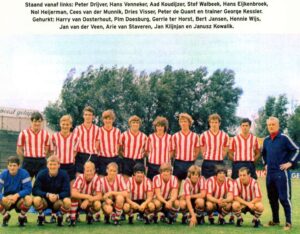 Sparta (Rotterdam) tried hard and lost only in the replay by a single goal – considering the strenght of Ajax, it was admirable effort.
Sparta (Rotterdam) tried hard and lost only in the replay by a single goal – considering the strenght of Ajax, it was admirable effort.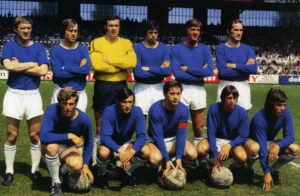 Ajax prevailed with great difficulties. Standing from left: Sondergard, Rijnders, Stuy, Suurbier, Krol, Suurendonk. Front row: Keizer, Swart, Vasovic, Cruijff, van Dijk
Ajax prevailed with great difficulties. Standing from left: Sondergard, Rijnders, Stuy, Suurbier, Krol, Suurendonk. Front row: Keizer, Swart, Vasovic, Cruijff, van Dijk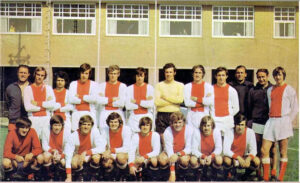 Ajax won their 6th Cup in 1971 and second consecutive one,but it was difficult victory, trailing twice in the first match, and opening the scores with quastionable penalty in the replay. Rinus Mischels was leaving, a few regulars were leaving, but the great squad was already at hand and going to win… everything. No need even to name the players – almost all of them are well known to young and old.
Ajax won their 6th Cup in 1971 and second consecutive one,but it was difficult victory, trailing twice in the first match, and opening the scores with quastionable penalty in the replay. Rinus Mischels was leaving, a few regulars were leaving, but the great squad was already at hand and going to win… everything. No need even to name the players – almost all of them are well known to young and old.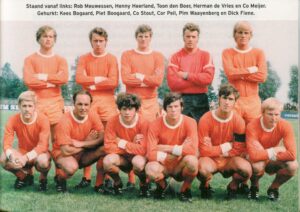 1 Volewijckers 32 20- 7- 5 47 65- 31 11- 4- 1 26 38-12 9- 3- 4 21 27-19
1 Volewijckers 32 20- 7- 5 47 65- 31 11- 4- 1 26 38-12 9- 3- 4 21 27-19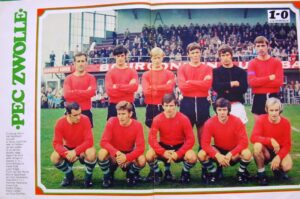
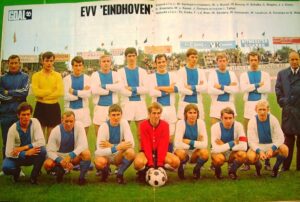
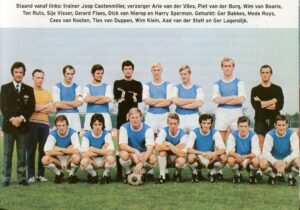 4 Hermes D.V.S. 32 17- 6- 9 40 51- 29 12- 2- 2 26 36-10 5- 4- 7 14 15-19
4 Hermes D.V.S. 32 17- 6- 9 40 51- 29 12- 2- 2 26 36-10 5- 4- 7 14 15-19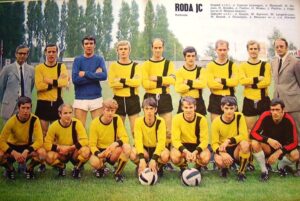
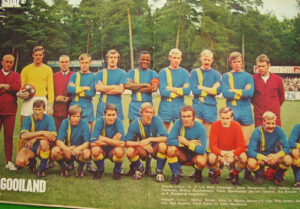
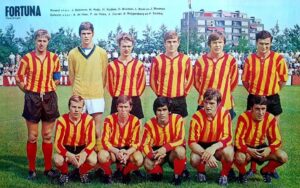 7 Fortuna Vlrd. 32 13- 7-12 33 39- 42 9- 4- 3 22 24-14 4- 3- 9 11 15-28
7 Fortuna Vlrd. 32 13- 7-12 33 39- 42 9- 4- 3 22 24-14 4- 3- 9 11 15-28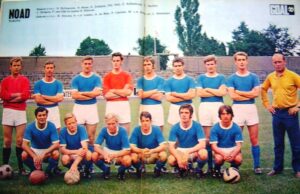
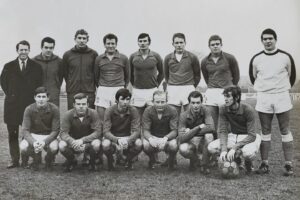 9 A.G.O.V.V. 32 12- 8-12 32 35- 41 5- 6- 5 16 17-15 7- 2- 7 16 18-26
9 A.G.O.V.V. 32 12- 8-12 32 35- 41 5- 6- 5 16 17-15 7- 2- 7 16 18-26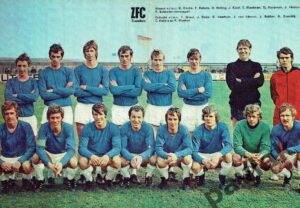 10 Z.F.C. 32 9-12-11 30 42- 42 6- 6- 4 18 24-18 3- 6- 7 12 18-24
10 Z.F.C. 32 9-12-11 30 42- 42 6- 6- 4 18 24-18 3- 6- 7 12 18-24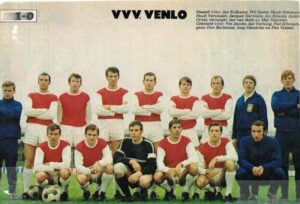 11 V.V.V. 32 11- 8-13 30 42- 46 5- 6- 5 16 18-18 6- 2- 8 14 24-28
11 V.V.V. 32 11- 8-13 30 42- 46 5- 6- 5 16 18-18 6- 2- 8 14 24-28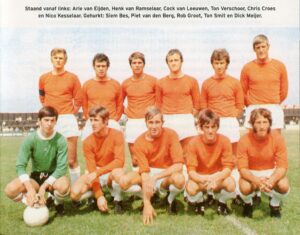 12 R.C.H. 32 8-13-11 29 42- 40 6- 6- 4 18 29-20 2- 7- 7 11 13-20
12 R.C.H. 32 8-13-11 29 42- 40 6- 6- 4 18 29-20 2- 7- 7 11 13-20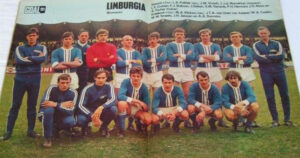 13 Limburgia 32 7-14-11 28 31- 39 7- 6- 3 20 24-16 0- 8- 8 8 7-23
13 Limburgia 32 7-14-11 28 31- 39 7- 6- 3 20 24-16 0- 8- 8 8 7-23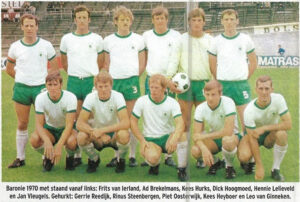 14 Baronie 32 7-10-15 24 38- 56 5- 8- 3 18 21-18 2- 2-12 6 17-38
14 Baronie 32 7-10-15 24 38- 56 5- 8- 3 18 21-18 2- 2-12 6 17-38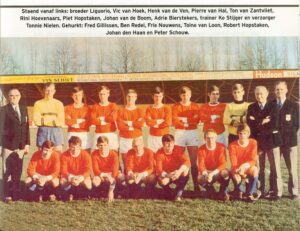 15 R.B.C. 32 5-13-14 23 32- 57 5- 7- 4 17 24-21 0- 6-10 6 8-36
15 R.B.C. 32 5-13-14 23 32- 57 5- 7- 4 17 24-21 0- 6-10 6 8-36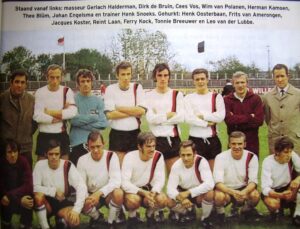
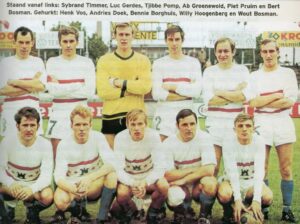 17 Spcl. Drente 32 3- 9-20 15 26- 55 3- 4- 9 10 14-25 0- 5-11 5 12-30
17 Spcl. Drente 32 3- 9-20 15 26- 55 3- 4- 9 10 14-25 0- 5-11 5 12-30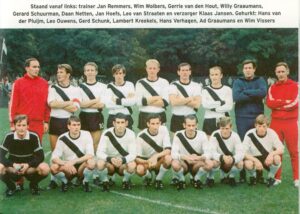 1 FC Den Bosch 30 18-10- 2 46 50- 18 9- 6- 0 24 29- 7 9- 4- 2 22 21-11
1 FC Den Bosch 30 18-10- 2 46 50- 18 9- 6- 0 24 29- 7 9- 4- 2 22 21-11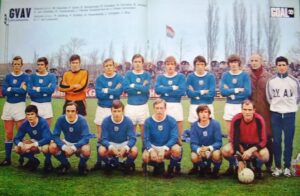
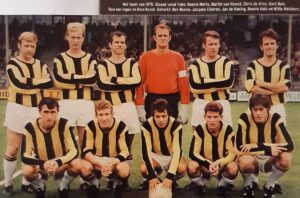 3 Vitesse 30 16- 6- 8 38 54- 31 12- 2- 1 26 36- 5 4- 4- 7 12 18-26
3 Vitesse 30 16- 6- 8 38 54- 31 12- 2- 1 26 36- 5 4- 4- 7 12 18-26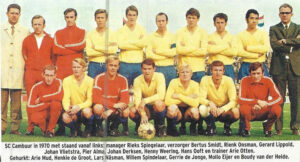 4 Spcl. Cambuur 30 13-10- 7 36 43- 34 10- 3- 2 23 25-12 3- 7- 5 13 18-22
4 Spcl. Cambuur 30 13-10- 7 36 43- 34 10- 3- 2 23 25-12 3- 7- 5 13 18-22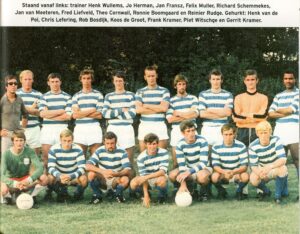 5 Blauw Wit 30 12- 7-11 31 44- 39 9- 2- 4 20 29-15 3- 5- 7 11 15-24
5 Blauw Wit 30 12- 7-11 31 44- 39 9- 2- 4 20 29-15 3- 5- 7 11 15-24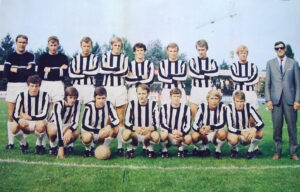
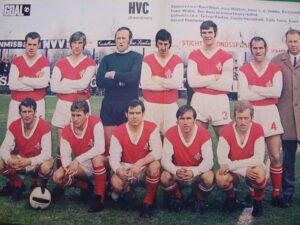 7 H.V.C. 30 10-10-10 30 31- 39 8- 4- 3 20 22-17 2- 6- 7 10 9-22
7 H.V.C. 30 10-10-10 30 31- 39 8- 4- 3 20 22-17 2- 6- 7 10 9-22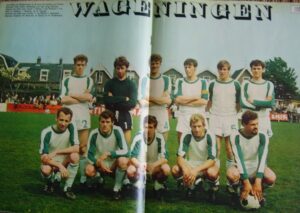
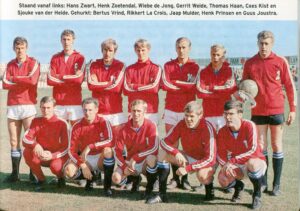 9 Heerenveen 30 7-14- 9 28 36- 37 5- 7- 3 17 24-17 2- 7- 6 11 12-20
9 Heerenveen 30 7-14- 9 28 36- 37 5- 7- 3 17 24-17 2- 7- 6 11 12-20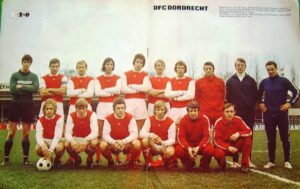
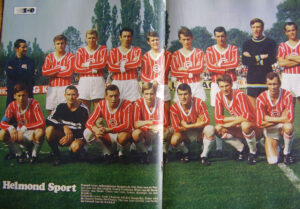
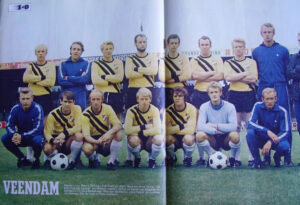
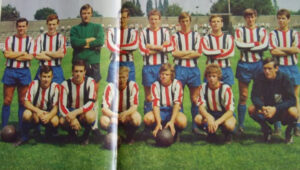
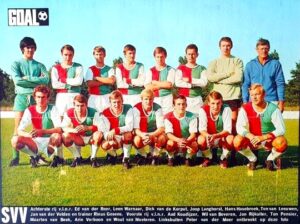 15 S.V.V. 30 5-13-12 23 34- 46 5- 7- 3 17 21-13 0- 6- 9 6 13-33
15 S.V.V. 30 5-13-12 23 34- 46 5- 7- 3 17 21-13 0- 6- 9 6 13-33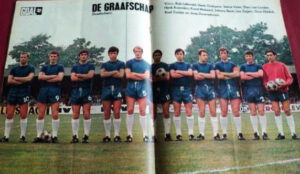 16 De Graafschap 30 7- 8-15 22 28- 42 5- 5- 5 15 21-20 2- 3-10 7 7-22
16 De Graafschap 30 7- 8-15 22 28- 42 5- 5- 5 15 21-20 2- 3-10 7 7-22